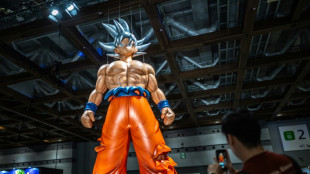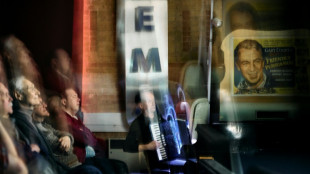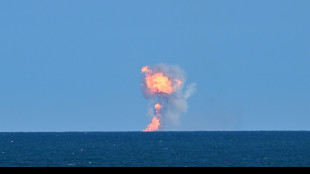
-
 Magritte painting nets auction record of $121 million
Magritte painting nets auction record of $121 million
-
Markets fluctuate as traders weigh geopolitical tensions

-
 N. Korea's latest weapon? Bombarding South with noise
N. Korea's latest weapon? Bombarding South with noise
-
'Kidnapped' Uganda opposition figure Besigye to appear at military court: lawyer

-
 Asian markets fluctuate as traders weigh geopolitical tensions
Asian markets fluctuate as traders weigh geopolitical tensions
-
'An inauspicious day': the landmines ruining Myanmar lives

-
 UN to vote again on Gaza ceasefire, US plans unclear
UN to vote again on Gaza ceasefire, US plans unclear
-
Japan's manga powerhouse 'Dragon Ball' turns 40

-
 Japanese, Koreans bottom of global love life survey
Japanese, Koreans bottom of global love life survey
-
Son blames 'mistakes' after South Korea held by Palestine in qualifier

-
 Japan ramps up tech ambitions with $65 bn for AI, chips
Japan ramps up tech ambitions with $65 bn for AI, chips
-
Lights, action, melodrama! Silent films get new reel at London haven

-
 Myanmar led world in landmine victims in 2023: monitor
Myanmar led world in landmine victims in 2023: monitor
-
ICC to sentence Timbuktu war criminal

-
 Ugandan opposition figure Besigye 'kidnapped', says wife
Ugandan opposition figure Besigye 'kidnapped', says wife
-
Australia's Jason Day eyes more major glory after resurgence

-
 Machu Picchu security boosted after visitors spread human ashes
Machu Picchu security boosted after visitors spread human ashes
-
Popovic hails Australia character in 'crazy' World Cup qualifier

-
 Taliban govt clearing 'un-Islamic' books from Afghanistan shelves
Taliban govt clearing 'un-Islamic' books from Afghanistan shelves
-
Argentina beat Peru as Uruguay hold Brazil

-
 Asian markets struggle as traders weigh geopolitical tensions
Asian markets struggle as traders weigh geopolitical tensions
-
Tatum stars as Celtics end Cavaliers unbeaten start

-
 Hurting India under pressure in blockbuster five-Test Australia series
Hurting India under pressure in blockbuster five-Test Australia series
-
'They killed her dream': Israel strike leaves woman footballer in coma

-
 Iraq holds its first census in nearly 40 years
Iraq holds its first census in nearly 40 years
-
Iraqis face tough homecoming a decade after IS rampage

-
 Russian net tightens around last civilians left in eastern Ukraine
Russian net tightens around last civilians left in eastern Ukraine
-
Olympic champion Tebogo aims to inspire next generation of African athletes

-
 Valencia on target as ten-man Ecuador upset Colombia
Valencia on target as ten-man Ecuador upset Colombia
-
'Rust' to premiere three years after on-set shooting

-
 Strike at French cognac maker Hennessy over measures in China spat
Strike at French cognac maker Hennessy over measures in China spat
-
Xi, Lula meet in Brasilia to 'enhance ties'

-
 SpaceX fails to repeat Starship booster catch, as Trump watches on
SpaceX fails to repeat Starship booster catch, as Trump watches on
-
'I have left a legacy': Nadal retires from tennis

-
 US recognizes Venezuela opposition's Gonzalez Urrutia as 'president-elect'
US recognizes Venezuela opposition's Gonzalez Urrutia as 'president-elect'
-
European powers, US seek to censure Iran at UN nuclear watchdog board

-
 UNAIDS chief says husband, Ugandan opposition figure Besigye, 'kidnapped'
UNAIDS chief says husband, Ugandan opposition figure Besigye, 'kidnapped'
-
Nadal's sensational career ends as Netherlands defeat Spain in Davis Cup

-
 US announces talks with Israel over civilian casualties in Gaza
US announces talks with Israel over civilian casualties in Gaza
-
SpaceX fails to repeat Starship booster catch, as Trump looks on

-
 G20 summit ends with Ukraine blame game
G20 summit ends with Ukraine blame game
-
Trump appoints TV celebrity 'Dr. Oz' to key US health post

-
 European stocks fall on Ukraine-Russia fears, US focused on earnings
European stocks fall on Ukraine-Russia fears, US focused on earnings
-
Last-gasp Szoboszlai penalty rescues Hungary draw with Germany

-
 Germany, Netherlands draw as Nations League group stage ends
Germany, Netherlands draw as Nations League group stage ends
-
Hong Kong tycoon Jimmy Lai takes witness stand in collusion trial

-
 Guardiola set to extend stay as Man City boss - reports
Guardiola set to extend stay as Man City boss - reports
-
Minnows Botswana hold Egypt to qualify with Mozambique, Tanzania

-
 Inter Miami coach Martino leaving club for 'personal reasons' - club source
Inter Miami coach Martino leaving club for 'personal reasons' - club source
-
Chinese man sentenced to 20 months for Falun Gong harassment in US


In new shake-up, French politics fragments into three blocs
France's political landscape is now fragmented into three blocs -- the centre, far-right and radical left -- after the abysmal performance of traditional parties in the presidential election.
Power alternated for decades until the 2010s between the two main parties -- the Socialists and Republicans -- before Emmanuel Macron took power in 2017 with a centrist platform.
His meteoric emergence -- and pillaging of key traditional right and left figures for his own centrist movement -- pushed the political centre of gravity on the left and right to the extremes.
Now, the traditional parties struggle to get even five percent of the vote, a situation that creates not just political but also financial problems for them under the French system.
"The first round of this presidential election confirms the three-way split of the electorate and the creation of three blocs with pretty much equal weight," said political scientist Gael Brustier.
It's the "cornerstone of the new world of French politics", he wrote in a Slate column.
Marine Le Pen, who will go head-to-head with Macron on April 24 in the second round of the election, and her National Rally (RN) party embody the far-right bloc.
Macron represents the centre while Jean-Luc Melenchon and his France Unbowed (LFI) party are the focus of the far left, taking a strong third place in Sunday's polls.
"The French political landscape has redefined itself around three political forces: a bloc which unites the centre-left and centre-right, embodied by Macron, the radical left, and far-right," Bernard Poignant, a former Socialist mayor who now supports Macron, told the Ouest France newspaper.
- 'Season 2' -
Socialist Party candidate Anne Hidalgo and the Republicans hopeful Valerie Pecresse were crushed on Sunday, winning only 1.75 percent and 4.78 percent of the vote respectively.
They now find themselves in dire financial straits since they finished below the five percent threshold for having campaign spending largely reimbursed by the state.
Financial woes are familiar to the Socialists. The party was forced to sell its historical headquarters in late 2017 to try to salvage its finances.
And Pecresse has launched a humiliating appeal for donations to try to save the party as it faces a 7.0-million-euro ($7.6 million) hole in its finances.
"The breakdown and reshaping of French political life began in 2017 with the advent of Macronism and the collapse of the Socialist Party," political scientist Jerome Fourquet told France Inter radio.
"And we watched season two yesterday (Sunday)..., the confirmation of the obliteration of the Socialists, the second historical pillar in the French political landscape, and the Republicans have been devastated as well," Fourquet said.
The last Socialist president was Francois Hollande, a deeply unpopular leader who never ran for a second term.
"What is the Socialists' reason for existing? What is the Republicans' reason for existing in a political system where you have a radical left, a central bloc that goes from the centre left to the right, and a far-right bloc?" asked Brice Teinturier, head of Ipsos polling company, told AFP.
"It's extremely difficult to find," he said.
- 'Elitist bloc?' -
However, unity within the extreme blocs is more fragile because of their diverse social make-up, rendering them more difficult to structure.
"I reject the idea of three blocs, left, centre and right," said pollster and political scientist Jerome Sainte-Marie at PollingVox. He sees a clash between an "elitist bloc" including the wealthy behind Macron, and a double "popular bloc".
Sainte-Marie pointed to "an alignment of managers and the retired" supporting Macron in the elitist bloc that unites individuals from a higher social class.
The popular bloc is "more mixed", with private-sector workers supporting Le Pen, while public sector workers and immigrant populations usually opt for Melenchon.
Melenchon benefitted from the support of other leftist formations, like the ecologists.
In addition to his base, he has "new reinforcements" with quite significant increases in... voters of immigrant origin", political scientist Fourquet said, adding that Melenchon had captured "even more of the culturally left-wing, teachers, students".
E.Hall--AT
